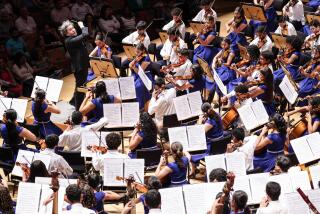Warm N. Korean overture greets N.Y. Philharmonic
PYONGYANG, NORTH KOREA — For the musicians of the New York Philharmonic, when the invitation came from North Korea, the answer was not automatic.
They posed many questions:
Is it morally wrong to perform in a country with such an abysmal human rights record?
Would we be in personal danger?
Do we need to bring our own toilet paper?
With some queries still unanswered, the orchestra landed Monday in what is essentially terra incognita. Although musicians are often used as cultural ambassadors, seldom has an American orchestra ventured into a country with which the United States has had so few official contacts.
The Philadelphia Orchestra went to China in 1974 only after President Nixon broke the ice. The New York Philharmonic played Moscow in 1988 on the heels of a visit by President Reagan.
“We’ve had no George Bush, no Condoleezza Rice,” said David Finlayson, a trombonist, as the Boeing 747 jumbo jet carrying the orchestra began its landing in Pyongyang. “Lorin Maazel is acting as our ambassador,” he added, referring to the Philharmonic’s music director.
Indeed, the 77-year-old conductor was treated as an American official at Pyongyang’s airport. He walked theatrically down the stairs of the airplane to an accompaniment of clicking camera shutters and was greeted by a line of officials from the North Korean Culture Ministry.
“We’ve always been greeted with great affection in closed societies, where we are seen as a lifeline to the outside world,” Maazel told reporters at the airport. “I’m a musician, not a diplomat, but I think that music is one area where people can always make contact.”
The musicians and their entourage of press and supporters -- about 300 people in all -- were escorted to a lavish welcoming banquet at the Grand People’s Culture Palace. Round tables were covered with platters of fish jelly, prawn salad and turkey slices in the shape of a floral basket. North Koreans, smiling with hospitality, poured endless glasses of ginseng wine. Women dressed in fluorescent-hued traditional gowns bowed to the arriving guests.
Dancers performed Korean folk dances, while a ballet troupe appeared to be presenting a version of “Swan Lake” that revolved around a dancer dressed as a Korean soldier waving a red scarf.
The New York Philharmonic musicians took nearly as many photographs as the journalists, and some said they would be doing blogs of the tour.
From inside their convoy, the musicians’ cameras clicked away at the ubiquitous posters of North Korea’s founder Kim Il Sung, his teeth glowing white through snowfall. The propaganda posters and a towering monument drew murmurs of, “Oh my God,” and, “Look at that.”
But all along, there have been decidedly mixed emotions about the trip. Like most New Yorkers, the Philharmonic musicians tend to be liberal politically. Although there were few Bush supporters in their ranks, many were mindful of remarks the president made in 2002, calling North Korea part of an “axis of evil” along with Iraq and Iran.
“My parents weren’t too thrilled about this,” said Lisa Kim, a violinist whose parents were born in South Korea and have vivid memories of the 1950-53 Korean War that left the peninsula divided. “I was really worried, too, about our safety. I didn’t want to go until they assured us we would have very tight security with us.”
A Russian-born musician, who did not wish to be quoted by name, said in a low voice, glancing at the ubiquitous North Korean security guards following the entourage: “These guys in dark suits give me the creeps. . . . I know too much about this kind of place.”
The New York Philharmonic had already been planning a trip to Beijing, Shanghai, Taiwan and Hong Kong when the invitation came last summer to visit Pyongyang. Zarin Mehta, the president and executive officer, was keen to accept. But he needed to convince the musicians, who are represented by the American Federation of Musicians.
“If we’d said no, it would have died there,” recalled Finlayson. Initially, there were great reservations. “I said to Zarin, I thought some improvement in their human rights record was in order before we should go.”
A senior American diplomat, Assistant Secretary of State Christopher R. Hill, spoke to the musicians about their misgivings. “At the end, we decided it was an opportunity to shed light on a dark corner of the world,” Finlayson said.
On the flight to Pyongyang, many of the musicians were carrying books about North Korea and said they had been educating themselves on the nation so seldom visited by Americans.
“I’m an adventurer. I believe in diplomacy. I figured why not?” said Erik Ralske, a French horn player who also traveled with the Philharmonic to Moscow in 1988.
Charles Rex, a violinist who was with the Philadelphia Orchestra on an early trip to China, said, “It’s always exciting to be the first in warming up relations.”
This is by far the largest delegation of Americans to visit Pyongyang since the Korean War. During the last year of the Clinton administration, Secretary of State Madeleine Albright visited. High-ranking officials of the Bush administration have declined because of continuing concerns about nuclear weapons and human rights.
North Korea remains on a blacklist of terrorism-supporting nations, although the Bush administration has promised to remove it in return for progress in dismantling its nuclear weapons program.
More to Read
The biggest entertainment stories
Get our big stories about Hollywood, film, television, music, arts, culture and more right in your inbox as soon as they publish.
You may occasionally receive promotional content from the Los Angeles Times.










